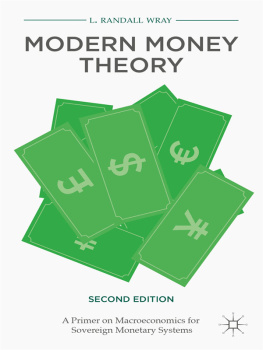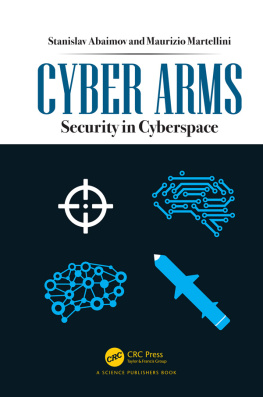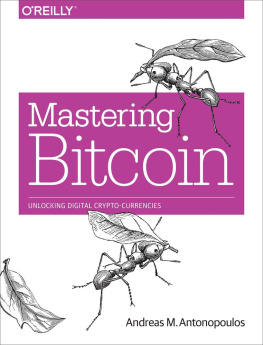Rogue Money and the Underground Economy
AN ENCYCLOPEDIA OF ALTERNATIVE AND CRYPTOCURRENCIES
John C. Edmunds, Editor

Copyright 2020 by John C. Edmunds, Editor
All rights reserved. No part of this publication may be reproduced, stored in a retrieval system, or transmitted, in any form or by any means, electronic, mechanical, photocopying, recording, or otherwise, except for the inclusion of brief quotations in a review, without prior permission in writing from the publisher.
Library of Congress Cataloging-in-Publication Data
Names: Edmunds, John C., 1947 editor.
Title: Rogue money and the underground economy : an encyclopedia of alternative and cryptocurrencies / John C. Edmunds, editor.
Description: Santa Barbara, California : Greenwood, [2020] | Includes bibliographical references and index.
Identifiers: LCCN 2019044029 (print) | LCCN 2019044030 (ebook) | ISBN 9781440864551 (hardback ; alk. paper) | ISBN 9781440864568 (ebook)
Subjects: LCSH: Cryptocurrencies. | Digital currency. | Informal sector (Economics)
Classification: LCC HG1710 .R64 2020 (print) | LCC HG1710 (ebook) | DDC 330dc23
LC record available at https://lccn.loc.gov/2019044029
LC ebook record available at https://lccn.loc.gov/2019044030
ISBN: 978-1-4408-6455-1 (print)
978-1-4408-6456-8 (ebook)
24 23 22 21 20 1 2 3 4 5
This book is also available as an eBook.
Greenwood
An Imprint of ABC-CLIO, LLC
ABC-CLIO, LLC
147 Castilian Drive
Santa Barbara, California 93117
www.abc-clio.com
This book is printed on acid-free paper 
Manufactured in the United States of America
Contents
Alphabetical List of Entries
Adware
Air Drop
Alpha Version
Anonymity
ASICs (Application-Specific Integrated Circuits)
Assassination Market
Asynchronous Arbitrage
Austrian School
Avatar
Backdoor
Baltic Money Laundering Scandals
Bancor
Beta Version
Blockchain
Bots
Brute Force Attack
Burning a Coin
Buterin, Vitalik
Central Bank
Checksum
Collision and Collision-Resistant
Conflict Minerals
Counterparty Risk
Cybercurrency, International Response
Cybercurrency Exchanges
Cybercurrency Mining Farms
Cybercurrency Programming Languages
Cybercurrency Slang and Acronyms
Dark Web
Decentralization
Decentralized Application
Decentralized Exchange
Decentralized News Service (DNN)
Degree of Difficulty Adjustment
Digital Signature
Dogecoin (DOGE)
Double Spend Problem
Drug Trafficking
Eavesdropping
Elliptic Curve Cryptography
Encryption
Ether
Ethereum Classic (ETC)
Ethereum Virtual Machine
Fashion and the Arts
Feint
Fiat Money
51% Attack
Financing Terrorist Organizations
Fork
Fractional Reserve Banking
Front-Running
Genesis Block
Gold Standard
Golem
GPU Mining
Great Depression
Great Recession
Hack
Hardware Wallets
Hash and Hashing
Identity Theft
Information Sources
Invoice Fraud
Le Numeraire
Libra
Malware
Mining
Mining Puzzle
Monero
Monetary Rule
Money Laundering
Mt. Gox Hack
Multisig
Orphan Transactions
Ostracism
Panama Papers
Parity Bit
Public Key/Private Key
Pump and Dump
Random Number Generator
Repositories
Ripple (XRP)
Scripting Language
Sex Trade
SHA-256
Side Chains
Silk Road
Single Point of Failure
Smart Contracts
Sock Puppet
Software Wallets
Specie
Stellar (XLM)
Tether (USDT)
Token
Transaction Fees
Trapdoor Function
Trolling
TRON
Trustless
Turing Complete Programming Language
Underground Economy
VeChain (VET)
Virus
Wallets
Wash Trades
Watering Hole Attack
Wildcat Banking
Wildlife Trafficking
Worm
Zombie Computer
Introduction
Since 2009, cybercurrencies have emerged, spread all around the world, and become a hotly debated topic. Cybercurrencies are forms of currency that exist only on the Internet. The best known of these is Bitcoin, but many others have been launched over the last decade as well. Prices rose so quickly that many early adopters got rich and then some saw their holdings get hacked or lose value. Other people, with skill and a bit of luck, maneuvered successfully through the hurly-burly beginning stages of this largely unregulated new economic world and held onto some of their impressive gains.
For many purposes, cybercurrencies function like government-issued paper currency. However, cybercurrencies open up new economic possibilities, particularly in areas where existing financial institutions function poorly. Constructive applications have been launched and have brought tangible benefits. Those advances, however, have been overshadowed by the notorious scams and abuses of many devious, harmful, malicious, and illegal applications that have been launched and have caused harm. Cybercurrency advocates believe that informed citizens and participants in the world economy will have to learn to distinguish the wheat from the chaff because they assert that ignoring this burgeoning phenomenon is not an option. Proponents of cybercurrencies assert that every major innovation in any field undermines some existing institutions that were operating satisfactorily before a better way emerged. In Venezuelas well publicized economic crisis, for example, businesspeople expressed frustration and anger with the slow pace of traditional transactions with local banks at a time when the nations currency was losing value at an alarming rate. According to advocates, cybercurrency allows users to bypass these formerly functioning institutions. Historians of science also point out that every major innovation has had a tumultuous adolescence. In the view of proponents of cybercurrencies, this new form of money and the rapidly evolving environment in which its operates are living up to that tradition.
This encyclopedia opens up the entire world of cybercurrency by explaining all major concepts and important terminology. It enables the reader to leapfrog the tedious, time-consuming trek through blogs, news sites, texts, videos, and audio clips upon which people have hitherto relied to piece together an understanding of how the whole cybercurrency phenomenon works. Many of those sources use jargon and acronyms, as if the reader were already in the know. This book offers a better way to learn about the world of cybercurrencies. It explains the whole field piece by piece, so that the reader can quickly get beyond the barriers to understanding and grasp why the uses of cybercurrency have grown so rapidly. It also informs readers how the underground economy has become so intertwined and commingled with cybercurrency. Many underground economic activities, like smuggling or tax evasion, existed long before cybercurrencies, but cybercurrencies have made it easier to circumvent government controls, easier to hide money, easier to make illegal payments for criminal activities, and much easier to transfer large amounts of money. This book also surveys steps that governments have taken to try to regulate cybercurrency and how users play cat-and-mouse games with government regulators to evade those controls.
To cover the entire field, the book casts a wide net. It includes coverage of terms and phrases that are used in electronic games because the earliest cybercurrencies were tokens that competitors accrued in their quests to win the most popular games. Those tokens could be used to buy special weapons, gain access to fortresses, and otherwise conquer the enemy. Players started trading those tokens, and a brisk market quickly developed. It did not take long for players to realize that trading the tokens could be a profitable activityand that token transactions could actually be used to send money from one player to another.
Next page

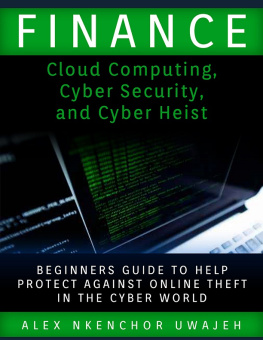
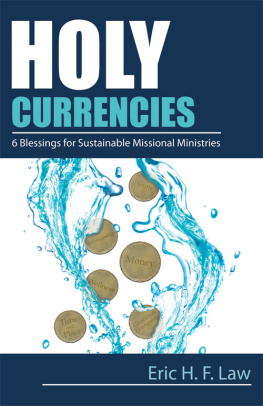
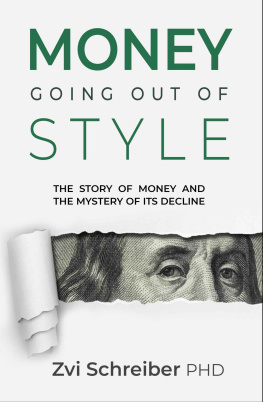
![Philip L. Reichel - Global Crime: An Encyclopedia of Cyber Theft, Weapons Sales, and Other Illegal Activities [2 Volumes]](/uploads/posts/book/272495/thumbs/philip-l-reichel-global-crime-an-encyclopedia.jpg)
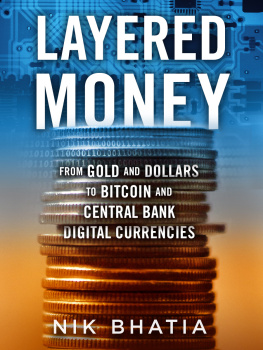
![Reichel - Global Crime: an Encyclopedia of Cyber Theft, Weapons Sales, and Other Illegal Activities [2 Volumes]](/uploads/posts/book/262750/thumbs/reichel-global-crime-an-encyclopedia-of-cyber.jpg)

